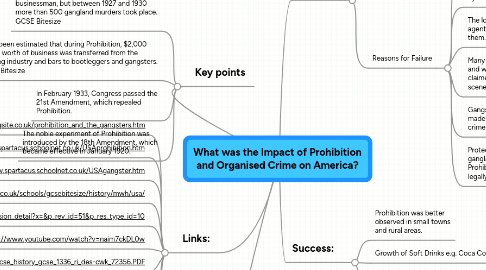What was the Impact of Prohibition and Organised Crime on America?
by T Brown


1. Key points
1.1. Capone claimed that he was only a businessman, but between 1927 and 1930 more than 500 gangland murders took place. GCSE Bitesize
1.2. It has been estimated that during Prohibition, $2,000 million worth of business was transferred from the brewing industry and bars to bootleggers and gangsters. GCSE Bitesize
1.3. In February 1933, Congress passed the 21st Amendment, which repealed Prohibition.
1.4. The noble experiment of Prohibition was introduced by the 18th Amendment, which became effective in January 1920.
2. Links:
2.1. http://www.historylearningsite.co.uk/prohibition_and_the_gangsters.htm
2.2. http://www.spartacus.schoolnet.co.uk/USAprohibition.htm
2.3. http://www.spartacus.schoolnet.co.uk/USAgangster.htm
2.4. http://www.bbc.co.uk/schools/gcsebitesize/history/mwh/usa/
2.5. http://www.schoolsnet.com/pls/hot_school/sn_revision.page_pls_revision_detail?x=&p_rev_id=51&p_res_type_id=10
2.6. http://www.youtube.com/watch?v=naim7ckDL0w
2.7. http://www.edexcel.com/migrationdocuments/Current%20GCSE/72356_uk_quals_gcse_history_gcse_1336_ri_des-cwk_72356.PDF
2.8. http://sites.google.com/site/mrdsmithhistory2/prohibitioncoursework
2.9. http://en.wikipedia.org/wiki/Prohibition_in_the_United_States
2.10. http://prohibition.osu.edu/content/proh1920.cfm
2.11. http://druglibrary.org/schaffer/alcohol/pa-157.html
3. Books
3.1. The USA, 1919-1941: by Aaron Wilkes
3.2. The USA, 1917-45 by Susan Willoughby, Mr Doug Willoughby
3.3. Discovering the Past: USA Between the Wars, 1919-41 by Rik Mills, Carol White, Maggie Samuelson
4. Failure:
4.1. Many people made their own alcohol called moonshine.
4.2. There was a huge increase in organised crime.
4.3. The Prohibition laws were frequently ignored in the larger cities.
4.4. The government lost money when it was no longer able to tax alcohol.
4.5. Reasons for Failure
4.5.1. There weren't enough Prohibition agents to enforce the law - only 1,500 in 1920.
4.5.2. The size of America's boundaries made it hard for these agents to control smuggling by bootleggers.
4.5.3. The low salary paid to the agents made it easy to bribe them.
4.5.4. Many Americans never gave their support to Prohibition and were willing to drink in speakeasies - bars that claimed to sell soft drinks, but served alcohol behind the scenes.
4.5.5. Gangsters such as Al Capone made money from organised crime.
4.5.6. Protection rackets, organised crime and gangland murders were more common during Prohibition than when alcohol could be bought legally.
